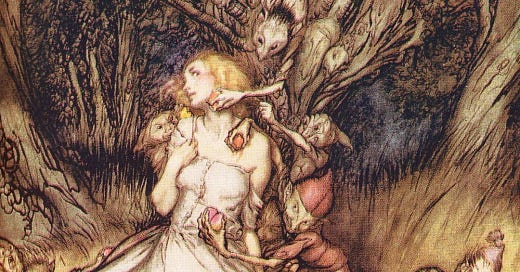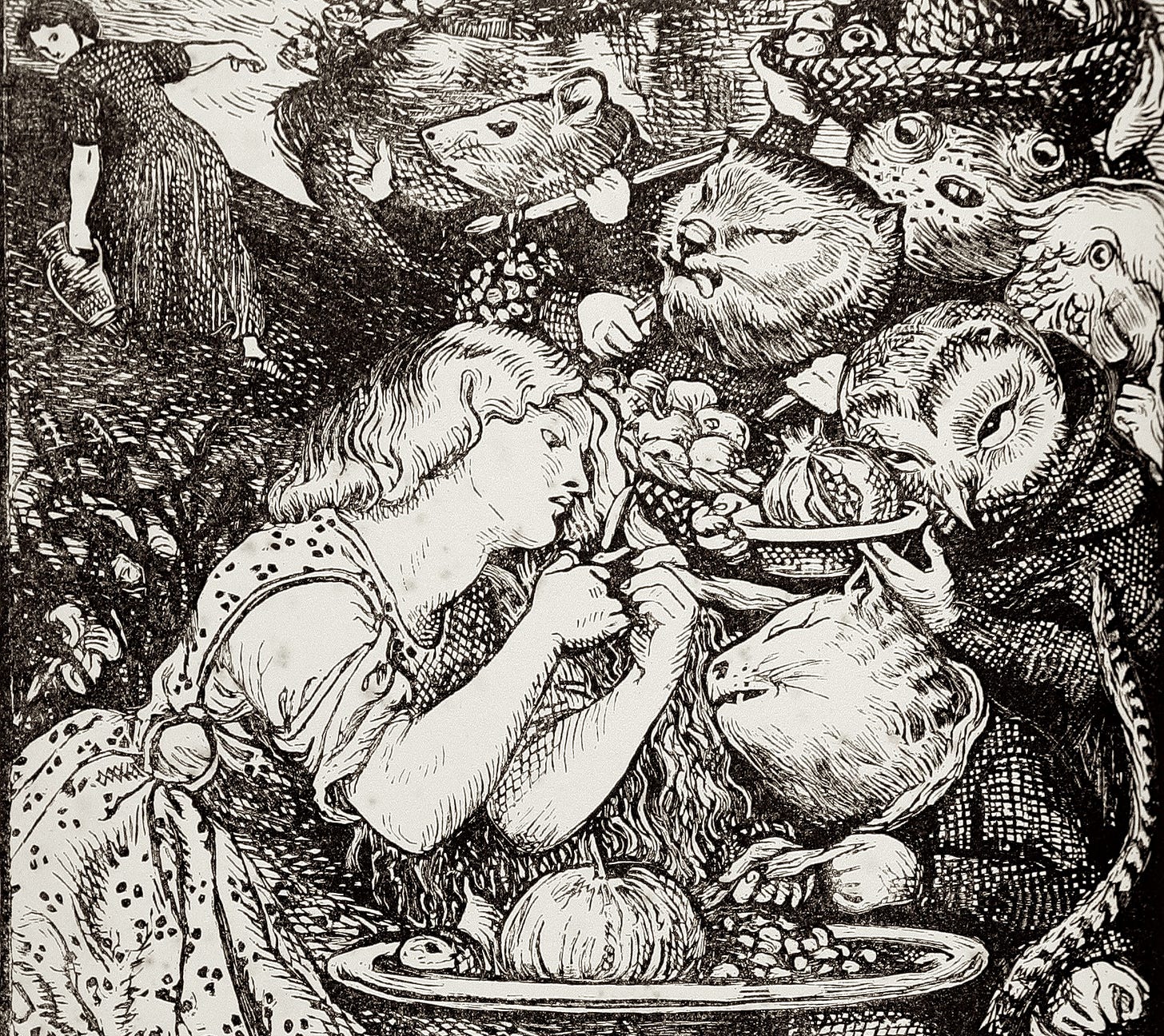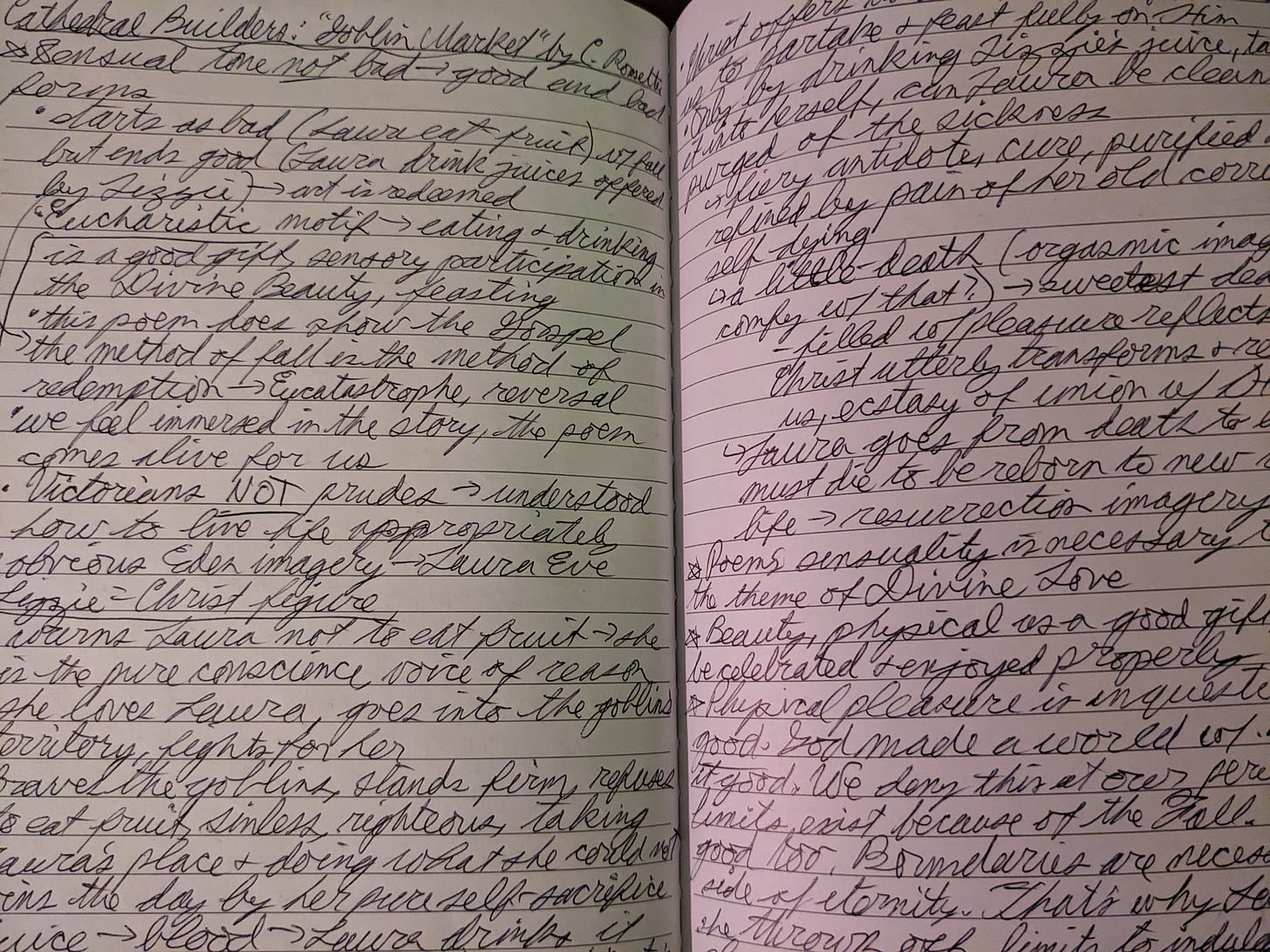CATHEDRAL BUILDERS: Poem Spotlight #3: "Goblin Market" by Christina Rossetti
"Morning and evening / Maids heard the goblins cry: / 'Come buy our orchard fruits, / Come buy, come buy'"
- This post was written entirely from the brain and heart of a real, flesh-and-blood, ensouled human being, with zero ideas, input or editing from AI. All artwork is credited to the original, human creators. I will never willingly outsource my brain to AI. EVER. -
July’s Cathedral Builders post honors another of my favorite poets, this time from the Victorian Pre-Raphaelite era: Christina Rosetti. “Goblin Market” is the most famous of her poems. I’ve included a link below because it is way too long to put in quotes here. Feel free to read this classic slowly and carefully (I recommend printing it out or purchasing a book of Rosetti’s poems) and return to this post once you’re done.
To summarize the poem before you begin: it concerns two sisters, Lizzie and Laura, and their encounters with unsavory goblin merchants selling fantastical fruit, tempting the maidens to “Come buy.” While prudent Lizzie refuses the goblins’ call and flees, adventurous Laura is intrigued and, like Eve in the garden, falls to their evil charms and eats the delicious forbidden fruit. She immediately falls under their spell, addicted to the taste, longing for more, absent-minded and unsatisfied with her home and family. She wastes away to the point of death while dreaming of what she cannot have.
Good Lizzie, unable to bear seeing her sister fade, finds the goblins and begs them for her sister’s life. They assault her, trying every trick they can to overpower her and make her eat the fruit, crushing the rinds and smearing her skin with the juices. But she resists them to the last, standing firm, until they leave her in frustration. Having braved the goblins’ onslaught, Lizzie returns home and bids Laura drink the fruit juices. When Laura drinks, the antidote’s bitterness repulses her and nearly kills her with the pain, fire scorching her veins until she falls senseless…dead or alive?
“Life out of death.” Laura rises the next morning “as from a dream,” fully restored and joyful. The two sisters grow up, marry and have children of their own, to whom Laura tells the story of her and Lizzie’s adventure with the goblins, warning them not to heed
“The wicked, quaint fruit-merchant men,
Their fruits like honey to the throat
But poison in the blood.”
Now, do not be content with this summary, dear friend. You cannot fully understand the poem unless you read it through, encountering the rhyme, imagery and emotional tug.
Read “Goblin Market” on Poetry Foundation
Well…
Now that you’ve returned, what are your thoughts, friend? What stood out to you about the themes? The language, characters, plot?
I’ll share a few thoughts on what struck me.
Sensual Language: It only takes one pass through “Goblin Market” for the reader to notice the vivid, sense-heavy language. It’s everywhere, most prominently in the goblins’ fruit and the sisters’ reactions to it. Food, eating and drinking are everywhere. The very first stanza lists dozens of ripe, luscious fruits of all kinds, ready to eat.
“Apples and quinces,
Lemons and oranges,
Plump unpeck’d cherries,
Melons and raspberries,
Bloom-down-cheek’d peaches,
Swart-headed mulberries,
Wild free-born cranberries,
Crab-apples, dewberries,
Pine-apples, blackberries,
Apricots, strawberries;—
All ripe together
In summer weather”
One’s mouth waters just reading about it. The reader herself is tempted to “taste and try” just like Laura. The poem drips with language that appeals to all the senses, but especially the sense of touch. The weather is “cooling.” The girls’ cheeks and finger tips tingle. The goblins coo, purr, whistle, laugh, grunt, hiss and snarl. White, gold and red are thematic colors in the piece. The events in the story themselves are physical: the girls crouch half-hiding in the rushes to hear the goblin-cries; Laura lingers, cuts off a golden curl to pay for her purchase, and eats the fruit (the pivotal moment in the story). In fact she doesn’t just eat, she sucks:
“Then suck’d their fruit globes fair or red:
Sweeter than honey from the rock,
Stronger than man-rejoicing wine,
Clearer than water flow’d that juice;
She never tasted such before,
How should it cloy with length of use?
She suck’d and suck’d and suck’d the more
Fruits which that unknown orchard bore;
She suck’d until her lips were sore”
When Lizzie confronts the goblins, they swarm her body, “hugg’d…kiss’d…squeez’d…caress’d her”, pressing fruit to her mouth until the juices run down her throat and her skin bruises.
“Though the goblins cuff’d and caught her,
Coax’d and fought her,
Bullied and besought her,
Scratch’d her, pinch’d her black as ink,
Kick’d and knock’d her,
Maul’d and mock’d her,
Lizzie utter’d not a word;
Would not open lip from lip
Lest they should cram a mouthful in:
But laugh’d in heart to feel the drip
Of juice that syrupp’d all her face,
And lodg’d in dimples of her chin,
And streak’d her neck which quaked like curd.”
Laura also clings to her, hugging and kissing until she is purified.
“Come and kiss me.
Never mind my bruises,
Hug me, kiss me, suck my juices
Squeez’d from goblin fruits for you,
Goblin pulp and goblin dew.
Eat me, drink me, love me;
Laura, make much of me;
For your sake I have braved the glen
And had to do with goblin merchant men.”
…
She clung about her sister,
Kiss’d and kiss’d and kiss’d her:
Tears once again
Refresh’d her shrunken eyes,
Dropping like rain
After long sultry drouth;
Shaking with aguish fear, and pain,
She kiss’d and kiss’d her with a hungry mouth.
The whole tale is vibrant, cinematic, immersive. It’s impossible to avoid the sensual overtones.
A common misconception lingers in the modern mind: weren’t the Victorians strict prudes, like the Puritans? Shunning and eschewing anything sensual or physical? My friend, that could not be further from the truth, for both the Victorians and the Puritans. Rossetti’s poem demonstrates this. Look at many other Victorian writers and artists (especially the Pre-Raphaelites) such as Alfred, Lord Tennyson, Dante Gabriel Rossetti (Christina’s brother), John William Waterhouse, Lawrence Alma-Tadema, and more. Their art, poetry, books, even architecture bursts with life and color. They understood the beauty and value of the physical world; not in a perverted or idolatrous way, but with a genuine zest for life.
Temptation, Fall and Redemption: You may be wondering how a poem like this could be a brick in the Kingdom’s cathedral. There’s no mention of Christ…in fact it could even be read as a pagan story.
Well, rest assured, dear friend, that Christina Rossetti was a faithful Christian throughout her entire life. Religious devotion was extremely important to her, and informs nearly all of her works. This most famous of her poems presents an obvious allegory of temptation, fall and redemption that echoes the Biblical story. It is a Christian poem to its core.
And I do mean obvious. Stupidly so. Laura, the Eve-figure, literally eats the forbidden fruit offered by the crafty, deceptive monster. Her mind is enlightened at the taste, but at what cost? For one, she gives up her precious beauty in a line easily missed:
“You have much gold upon your head,”
They answer’d all together:
“Buy from us with a golden curl.”
She clipp’d a precious golden lock,
She dropp’d a tear more rare than pearl”
Laura pays with a golden lock of hair in lieu of a coin. The common literary theme of women cutting their hair as payment represents them giving up their power, beauty or innocence. Especially to the Victorians: a woman’s long hair was a sign of her femininity and strength.
After Laura eats the fruit, she craves more and more: nothing is ever enough; she is never satisfied, haunted and tormented by her sin until it withers her from the inside out to the point of death.
Weakened by the fruit’s spell, Laura cannot save herself. Her redemption must come from an outside source. And here I come to my third and final observation:
Lizzie as a Christ-Figure: Again with the overt imagery. If Laura represents fallen humanity, then Lizzie is the image of Christ who saves her. Lizzie, the voice of conscience and reason, warns her sister not to eat the fruit. After the fateful deed is done and Laura is dying from the corruption, Lizzie loves Laura enough that she ventures into the goblins’ territory to fight on her behalf. The forces of evil attack her, but she stands firm and refuses to eat the fruit despite the goblins’ anger. Sinless and righteous she takes Laura’s place and does what her sister could not. Lizzie wins the day through the purity of her self-sacrifice and love.
When Lizzie returns triumphant from her battle with the goblins, her body is bruised and dripping with the fruit-juices, echoing how Christ’s own body dripped with his red blood on the cross. She bids Laura drink the juice in what I think is the most gospel-centric line of the poem:
Eat me, drink me, love me;
Laura, make much of me;
For your sake I have braved the glen
And had to do with goblin merchant men.
Laura drinks the juice and is cleansed, tears falling with mingled joy and grief. We likewise participate in Christ’s death and resurrection; entering into a mysterious, Eucharistic union with his body and blood, shed for us and sweeter than any earthly fruit. Christ offers us all of Himself, inviting us to partake and feast, to love and make much of Him, for He has braved the horrors of sin, death and hell for us. He is the only way of salvation from our sin and corrupted old self. So too, only by drinking Lizzie’s juice, taking it into herself, can Laura be cleansed, purged of the sickness which wastes her away.
Upon drinking the juice, Laura’s “lips began to scorch, / That juice was wormwood to her tongue.” The fiery pain of her old self’s death purifies and refines her. She undergoes a little-death, filled with pleasure and pain, reflecting how Christ utterly transforms and redeems us through the ecstasy of our union with Him. Laura goes from death to life. She must die to be reborn.
Some may find the intensely physical, even erotic imagery in this poem uncomfortable. I hesitated about it at first. But we need not fear. Beauty, the senses, and the physical world are good gifts. God’s people should celebrate them properly. Physical pleasure is unquestionably good. God made a world with rivers, paint, hair, turtles, roses, trees, pianos, earthworms, peaches, eyelashes, sunsets, and sex. And He called it good. We deny this at our peril.
Now, limits exist because of the Fall. Those are good too. Boundaries are necessary this side of eternity because humans struggle with self-control. That is why Laura falls: she throws off limits to indulge in pleasure without right restraint. Thus, she becomes addicted…enslaved. What seemed infinitely pleasurable lasts only for a moment before becoming a curse.
That’s why we need Christ. Not just to redeem us but to remake us. To completely overhaul how we experience life. When we submit to Him and love Him freely, all our other loves become rightly ordered and good, as they were originally intended to be. We can resist temptation and pull through the struggle with evil because of His love. He has fought and defeated the goblins for us. Now, he invites us into the inexpressible joy of unity with Him, that we may drink His sweet nectar of grace and experience the fullness of true Life in Him. He is the satisfaction of all our hungers. Rossetti knew this truth well. “Goblin Market” helps us to know it too.
Build in hope,
-Laura







